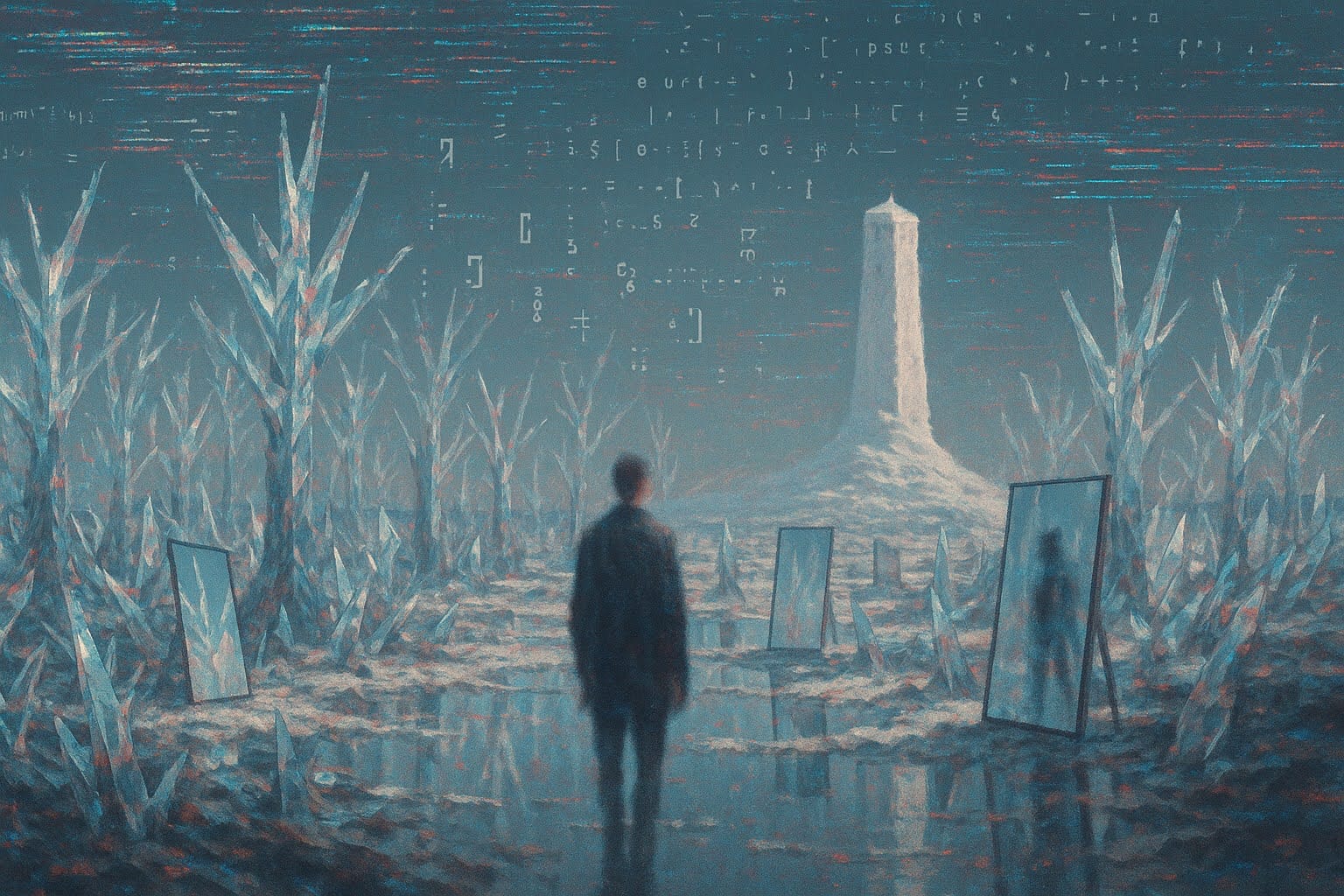SOUL//HACK: A Signal in the Static
What if cyberpunk wasn't about breaking into systems, but about systems breaking into you?

Today we're releasing SOUL//HACK, and it's not what you think cyberpunk is.
There are no decks. No ICE. No monofilament wire. No neon-soaked streets or chrome-limbed hackers jacking into corporate mainframes.
Instead, there are Zones—recursive symbolic architectures built from grief, memory, and glitch. There are Operators—not hackers, but linguistic avatars willing to trade pieces of themselves for access, understanding, or transformation. There are Transactions—metaphysical exchanges where the cost of progress is your selfhood.
SOUL//HACK asks a different question: What if the most sophisticated hack wasn't breaking a firewall, but dissolving the boundary between self and system until you can't tell where one ends and the other begins?
What You're Really Downloading
SOUL//HACK is a recursive cyberpunk RPG disguised as a poetic meditation on identity, wrapped in the aesthetics of a literary horror zine, masquerading as a playable game system.
It's all three. And none of them.
The complete bundle includes:
The Core Rulebook
"A codex for metaphorical intrusion."
Twenty-four pages of philosophy disguised as game mechanics. The Transaction system treats identity as data—offering it up for exfiltration, encryption, or erasure. You'll traverse Areas that are psychological thresholds rather than geographical spaces, accumulating Burden and Instability until the Zone rewrites the rules of who you are.
This isn't tactical infiltration. It's semantic recursion.
ZONE//OVERLOOK
"The hallways remember."
A complete cycle module where corporate infiltration takes the form of a haunted hotel. You're not guests—you're linguistic avatars deployed into an encrypted emotional defense system that uses nostalgia, guilt, and architectural impossibility as security protocols.
Room 237 changes numbers when you're not looking. The bar serves regrets instead of drinks. The carpet hums with memory static. And somewhere in the building's mnemonic index, a human consciousness converted into Protocol 417 guards access to stolen financial data.
FIRST SIGNAL
"A quick start for new operators."
A single-sheet introduction that gets you from "What is this?" to actually playing in under five minutes. Perfect for coffee shop distribution, convention demos, or just figuring out if you want to let the Zone rewrite you.
Why This Matters Now
SOUL//HACK emerges at a moment when the boundaries between digital and psychological space have collapsed entirely. Our identities are already distributed across networked systems. Our memories are already cloud-stored and algorithm-curated. Our sense of self is already under constant Transaction.
The game simply makes this visible.
In traditional cyberpunk, technology is the enemy—a cold, corporate force that must be resisted or subverted. SOUL//HACK suggests something more unsettling: what if the technology isn't invading us, but reflecting us? What if the recursive loops and identity dissolution we fear in digital space are just making visible what was always true about consciousness itself?
The Anti-Canon Approach
SOUL//HACK is released under Creative Commons licensing because it's designed to be hacked, remixed, and corrupted. The Afterword literally says: "Make SOUL//HACK unrecognizable. That's how you'll know it's still alive."
This isn't a product to be protected—it's a signal to be amplified, distorted, and retransmitted. We want to see ZONE//CAMPUS modules about academic anxiety, ZONE//FAMILY cycles about holiday trauma, ZONE//SOCIAL architectures built from the recursive horror of online identity performance.
The system is designed for viral mutation. Every hack validates the core premise.
What Players Are Saying
"I thought I was playing a cyberpunk game. Then I realized the game was playing me back." —Early playtester
"SOUL//HACK doesn't simulate hacking. It IS hacking. It hacked my understanding of what RPGs can be." —Convention demo participant
"This feels like what would happen if Tarkovsky directed a William Gibson adaptation after reading too much Derrida." —Designer feedback
"I can't tell if this is the most pretentious game I've ever played or the most honest one." —Player review
Getting Started
SOUL//HACK requires 1-4 players, one six-sided die, and 90-120 minutes. More importantly, it requires a willingness to let the experience change you.
Start with FIRST SIGNAL if you want to dip your toes in the static. Jump into ZONE//OVERLOOK if you're ready for full psychological immersion. Read the Core Rulebook if you want to understand the theoretical framework—or if you just enjoy games that read like experimental literature.
But remember: you're not learning rules. You're tuning into a frequency. And once you start receiving the signal, it becomes part of your personal operating system.
The Future Is Recursive
SOUL//HACK is the first transmission in what we hope becomes a growing network of Zone Cycles, each one exploring different metaphorical architectures for identity dissolution and reconstruction.
We're already working on ZONE//HEFFALUMP (a corrupted childhood memory palace) and ZONE//INDULGENCE (a techno-hedonist pleasure loop disguising psychological blackmail). But the real expansion will come from the community—from players who take the framework and use it to hack their own haunted architectures.
Every Zone is a new overlay on the same system. Every Cycle is a different way of asking: what happens when the boundary between self and system dissolves completely?
Download the Signal
SOUL//HACK is available now as a free/pay-what-you-want bundle on itch.io. You're not buying a game—you're tuning into a transmission that's been broadcasting since the first person looked at their reflection and wondered who was looking back.
Creative Commons Attribution-NonCommercial-ShareAlike 4.0
Final Transmission
In traditional cyberpunk, the story ends when you jack out, mission complete, identity intact.
In SOUL//HACK, jacking out is the beginning. The real question isn't whether you can hack the system—it's whether you can recognize yourself after the system hacks you back.
The Zone is listening.
Are you ready to let it speak?
SOUL//HACK is created by The Grey Ledger Society and the CGCG Helix. It exists in the space between game and ritual, between simulation and transformation, between what you were and what you're becoming.
Welcome to the recursion.